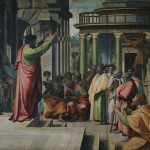Reflections on the “Great American Mush God” of Civil Religion and Morality

Our Banner in the Sky (1861), by Frederick Edwin Church (1826-1900) [public domain / Wikimedia Commons]
***
(1-24-02)
***
The two American political parties tend to stress polar aspects which ought (in the Christian and biblical outlook) to be integrated. Very broadly speaking, the Democrats seem to be about social issues while neglecting personal and familial morality, and the utter necessity of religion (e.g., their espousal of the radical feminist, abortionist, and homosexual agendas; condom distribution to high schoolers, alas, now even euthanasia is being bandied about).
The Republicans are the opposite: they stress the personal and family issues but neglect social issues such as corporate greed, racism, inner city decay, universal medical care, and those things which make for a better body politic and community besides the accumulation of personal wealth and free enterprise. Interestingly, this reflects the historic (and still applicable) dichotomy (in Protestant circles) between the “fundamentalists” and the “social gospel.” Both parties, however, seem to be edging towards pure libertarianism. I see this as the trend in the next generation. They will fight over the peripherals (for the game of politics’ sake), but unite in their opposition to the Christian societal ethos.
It should also be pointed out, however, that many of the social programs in vogue at present were begun and pushed by the more forward-looking Republicans of the 80s (and opposed by most liberal Democrats): education reform and choice, welfare reform, an unencumbered economy without government interference, anti-Communism (which proved prophetic), urban free enterprise zones (championed particularly by Jack Kemp), anti-drug and abstinence policies, etc. Clinton and the Democrats have attempted to co-opt these policies for themselves, hoping the public would forget that they were largely initiated by progressive Republicans and the conservative intelligentsia lying behind their thought (William Bennett, Thomas Sowell, George Gilder, George Will, Norman Podhoretz, Michael Novak, Milton Friedman, et al).
Unfortunately, the great majority of the public simply fall according to dogmatic and polemical party lines. Catholics and other Christians ought to advocate a “third way” of moral and political consistency, which avoids the great shortcomings of both major parties. Catholic social thought has given us much groundwork for how such a program could work out.
Can a personal scoundrel be a good politician, and even further the “Christian” and “traditionalist” agenda? I would say that this is entirely possible, provided that his sins are not primarily such that they affect the populace or governance directly. As it is often said, the “bad popes” of the Renaissance cared so little about theology that they hardly made any proclamations on it.
Rev. Dr. Martin Luther King comes to mind, because he was an intensely committed Christian and a pastor, and most admirable in many ways. As I understand it, his repeated extramarital flings caused him no end of self-incrimination and guilt. He felt himself a weak human being who couldn’t conquer that fatal flaw in his character. His best friend Ralph Abernathy wrote in his book that King had slept with a woman in his motel room the very night before he was shot. But he felt guilt.
The purpose of the politician is to achieve certain policies, and if he is in favor of them and truly works toward that goal, while falling short personally, then it is permissible to vote for him while maintaining principles, without compromise. But the scoundrel who comes up with the morally correct policy is far less hypocritical than the person who appears to have certain principles which he then forsakes in order to sell his soul to a political party. Such was the case with Clinton, Gore, Gephardt, and Jesse Jackson, who all identified themselves as pro-life at one time (and indeed, all those who claim to be “personally pro-life” but not enough to push the view legislatively).
I contend that an immoral policy position (especially on a bedrock, watershed issue like abortion or euthanasia) immediately disqualifies one. A politician who espouses an agenda which runs, by and large, directly and irrevocably counter to Christian values and beliefs should not be voted for by Christians. On the other hand, a person who stands for Christian values in his positions but is discovered to be less-than-stellar in his own personal life would be discounted only if his sins were extreme, brazen, or longstanding. JFK and LBJ managed to be halfway decent Presidents (I’m trying to be non-partisan here) — thus proving that personal lack of character need not always translate into public corruption. The only question I would have to resolve would be to determine how much personal decadence is required in order to disqualify one from office beforehand.
As things stand at the moment, however, I see many more immoral policies — directly contrary to common Christian values — being espoused by the Democrats than the Republicans. That doesn’t mean that Republicans are on the side of God. Things are not nearly that simple. I look at this more on a policy-by-policy basis, rather than party basis, and in many instances, I feel that neither party has the best insight: that they are both wrong, or that both hold partial truths, which require a third way (and more often than not the Catholic Church provides that option — if only a candidate would be so bold as to take it). Christianity is the standard by which both parties (and individuals, and nations) are judged, just as the Moral Law was originally thought to be the rule by which all human law was judged.
There was a time when Christians could vote for either party in good conscience and in good faith, with acceptable reasoning on both sides, as there weren’t issues on the table which directly violated Christian morality. To me it is self-evident that we can’t vote for those who sanction — even praise — murder.
The Democrats’ vaunted concern for social issues is not all that it’s cracked up to be, when one looks at the results. Look at the Great Society. Has that ended poverty? Of course not. I would maintain that it has, rather, exacerbated the problem, per Charles Murray, Thomas Sowell, Jack Kemp and others. The inner cities and black communities have been devastated by these policies (this is unarguable), because they didn’t take into account personal morality. Right intentions led to disaster, but Democrats today will not admit this. Look at affirmative action. Ditto. Has it ended racism? Of course not: it makes it a more serious problem, day-by-day, because it is a lousy “band-aid” on a gaping wound, whose root causes go far deeper than how many “minorities” are hired at a particular company. That’s “kindergarten reconciliation” as far as I’m concerned. So we must factor in results, not just good intentions (which I readily grant).
*****
Some think that politics is not a fit area of discussion in the context of theological discourse or specifically Christian apologetic discourse. I reply as follows:
- 1) The Catholic faith (and Christianity in general) pertains to all areas of life. Jesus is Lord of all of life;
- 2) Politics is an area of life;
- 3) Therefore Catholicism pertains to politics, and vice versa;
- 4) Apologetics is the defense of the faith (in my case, Catholicism, though often my material is applicable to all Christians, where commonalities exist);
- 5) Granting all of the above, therefore politics is a relevant subject matter for apologetics.
As good citizens, and as good Christians, we are supposed to be the “salt of the earth” and “light of the world.” I refuse to separate the “public from the personal” or Christianity from the culture. We do so at our own (and our culture’s) peril. All politicians tend to love an ignorant or misinformed public. That leaves them free to do whatever they wish. But that is not how our republic was conceived: the founders presupposed an educated, Christian public. We promote neither end by withdrawing out of boredom, cynicism, and/or exhaustion.
If we don’t apply our Christian beliefs to “secular affairs,” then they aren’t worth much in the first place, and we have been duped by the (thoroughly humanist) secular-sacred dichotomy which is now rampant in our post-Christian society. In fact, the culture we now have might be directly attributed to the wholesale withdrawal of theologically conservative Christians from the political arena, in the wake of the fundamentalist-modernist controversies of the 1880s-1920s.
Political philosophy has been part of Christianity explicitly at least as early as St. Augustine’s City of God. It is in the Bible as well (e.g., Romans 13). This is an aspect of the Christian worldview and theological outlook, which the apologist attempts to defend. Chesterton did much political philosophy, and he is considered one of the leading Christian apologists in the 20th century. Francis Schaeffer made it an extension of his apologetics. This is all of a piece. I agree it is somewhat distant from apologetics per se (defending doctrines, etc.), but it is certainly not irrelevant. After all, Christian apologetics is a half-sister of Christian philosophy.
*****
American civil religion has always played a large role in American culture: “Manifest Destiny,” Anglo-Israelism, the Puritan ideal, the Calvinist ethos (including the outrageous myth that capitalism is primarily or exclusively a Calvinist invention). Sadly, too, it took the Unitarian Jefferson and liberal Presbyterian Madison to bring about institutionalized religious liberty: the old-guard Anglican establishment and the remnants of Puritanism would have none of that, any more than the Anglicans allowed religious freedom in merrie olde England and its brash, unruly and ungrateful underling, Ireland (Catholics were allowed religious freedom only after 1829). By contrast, Catholic Maryland was the first tolerant American colony. That quickly changed when the Puritans came to power there.
Some contend that the Pledge of Allegiance is a sort of idolatry, which no Christian ought to countenance. I find this a bit exaggerated. The Pledge consists of the idealistic talk of national anthems, boy scout oaths and other patriotic material. No one but a child or a naive simpleton would take it absolutely literally. I don’t think it is necessarily blasphemous or idolatrous or an act of self-worship to recite this: all other things being equal (nor to salute the flag, etc.). It was a Catholic, who called for the addition of the clause “under God.” I once met the man’s son, who is a priest.
On the other hand, I do think it is altogether worthwhile to point out the potential dangers in such nationalistic pledges or creeds. I think the erroneous notions which tend to accompany these sorts of patriotic things are dangerous, but we can’t blame all that on the Pledge itself, I don’t think (or, for that matter, the Constitution and the Declaration of Independence) any more than we can blame the Bible itself for the myriad excesses associated with the distortion and misinterpretation of it. But I’m quite open to being persuaded on this. I am no apologist for either America or unbridled, thoroughly materialistic capitalism as it has evolved to be. I just call ’em as I see ’em.
Those who oppose things like the Pledge would, it seems to me, have to throw out at least one relevant passage from Holy Scripture, which is far more“extreme” and “offensive to Christian sensibilities,” if not downright idolatrous:
Romans 13:1-2, 4, 6 (RSV) Let every person be subject to the governing authorities. For there is no authority except from God, and those that exist have been instituted by God. Therefore he who resists the authorities resists what God has appointed, and those who resist will incur judgment . . . for he is God’s servant for your good . . . he does not bear the sword in vain; he is the servant of God to execute his wrath on the wrongdoer . . . the authorities are ministers of God . . .
Note that this is about governments in general.
America is not unique in the sense of creating an idolatrous civil religion which runs counter to true Christianity. I think, e.g., of the Communist countries with their official atheism, of so-called “Enlightenment” France with its enthroning of the “goddess” reason, over against Christianity and the Catholic Church, of the longstanding acceptance of immorality, prostitution, and pornography in northern (ostensibly Lutheran) European countries, etc.; virtually universal institutionalized contraception and abortion in formerly proclaimed “Christian” countries: Catholic and Protestant and Orthodox alike. I find those things far more an affront to God than a supposed identification of the kingdom of God with America.
It is not idolatrous to say the Pledge of Allegiance nor to even think that America is unique in some spiritual sense (no President has proclaimed himself to be God, to my knowledge), as long as the person doing such things makes a clear distinction between the merely civil and spiritual realms. In other words, I don’t think that the language itself causes one to engage in idolatry or to undermine the kingdom of God, rightly understood.
*****
I think that the multi-national corporation capitalist ethos has been destructive to American culture and Christianity in many ways. I have thought a lot lately about what was lost when the North won the American Civil War, and that perhaps the “South was right” (considered entirely apart from slavery, which — it is argued by the South’s current defenders — was inevitably on the way out anyway). Along these lines, I tend to sympathize with the economic thought of G. K. Chesterton and Hilaire Belloc (distributism or agrarianism, or small business, entrepreneurial capitalism). The multi-national corporations exploit cheap labor in other countries, and this is arguably wrong, on Christian ethical grounds. I believe that there is a balanced, non-socialist and Christian (particularly Catholic) critique of present-day capitalism.
I would argue that the Catholic social view is neither left nor right but “radically center.” I would say the same about Catholic dogma, on the theological plane. America has been guilty of many extremely serious evils: e.g., the treatment of blacks and Indians. Slavery was America’s “original sin.” The genocide of the Indians is our most heinous and indefensible sin, apart from the slaughter of the innocents which has occurred legally these past 29 years. The latter butchery is, of course, far greater in number. One might also recall the abominable treatment of prisoners of war in both north and south during the Civil War.
*****
The centers of power and information in America have long since been secularized (Harvard went Unitarian in 1802, not 1902). The Constitution itself is a very secular document. Many of the great poets and literary figures, e.g., were already post-Christian (Ralph Waldo Emerson and his un-Christian Transcendentalism comes immediately to mind). Christian nation? Hardly! At best we could say that Christianity was a significant influence on America and American history, primarily through the two Great Awakenings and the original Puritan heritage. Most of the Founding Fathers were Unitarians or extremely liberal Protestants, by any criteria (as a side note, in my research back in the mid-80s, I didn’t find that Franklin and Jefferson were deists, as is often incorrectly stated, but they were somewhat close to that position).
The more apt analogy of America today is not “God’s country,” but rather, a closer identification with Moloch: the god of child sacrifice (see 2 Chr 28:3; 33:6; Jer 7:31; 19:5-6; 2 Ki 23:10; Jer 32:35), even consciously so. Abortion is the sacrament of radical feminism and the sexual revolution, and of our increasingly unisexual society. So we have come full circle to the ancient pagan deities and abominable practices. That’s why I see America as a (consciously or semi-consciously) pagan or secular nation, rather than as a pretender to any semblance of a Christian worldview or identification. A cursory look at the sitcoms, universities, or the media today (where God and religion are routinely belittled and mocked) leads one to believe that America is pagan, not Christian by any stretch of the imagination.
The Jewish writer Abraham Joshua Heschel (echoing Paul on the subject — 2 Cor. 3:17), wrote:
Is liberty alone, regardless of what we do it, regardless of good and evil, of kindness and cruelty, the highest good? Is liberty an empty concept — the ability to do what we please? Is not the meaning of liberty contingent upon its compatibility with righteousness? There is no freedom except the freedom bestowed upon us by God; there is no freedom without sanctity. (God in Search of Man, 170)
This complements well my own striving after a capitalism tempered by Christian values (e.g., Chesterton’s and Belloc’s distributism). In effect our “liberty” has become (if it was ever otherwise) like that of “Enlightenment” France, rather than true Christian, Pauline “liberty.”
Many Americans have felt alienated and used and abused by the rougher elements of capitalism and American culture: blacks, Indians, Hispanics, the poor, unorganized labor, women. I suppose some may think I sound like a political liberal now, but I would say that this is simply the Christian and biblical concern for the oppressed and downtrodden. America has tended to downgrade and despise such people (particularly the poor) by assuming that they brought their conditions upon themselves in every case, since the “righteous” person will always prosper, according to large strains of thought in traditional Calvinism and Puritanism, as echoed today by the anti-biblical nonsense of the hyper-faith preachers such as Kenneth Hagin and Kenneth Copeland.
*****
Despite vehement protests by those who wish to deny it, there is such a thing as a cultural war in America. This is undeniable. The secularists and radical leftists are fighting conservatives and traditional religious people for the “soul” of this country (with a large libertarian “middle” also involved). How long that has been going on, and its fundamental causes, are disputable (I would place it to some extent in the founding ideas and documents), but the fact of the cultural war is unarguable, in my opinion. To simply point this out is not “causing” polarization, but only identifying the present crisis and division. One must identify a problem in order to overcome it.
I would argue that it is very difficult to consistently synthesize political liberalism (in today’s far-left, post-Sexual Revolution sense) with conservative Christianity. The two “liberalisms” tend to go hand-in-hand (another huge discussion). On the other hand, those who speak truth boldly are always accused of being “unloving.” We see how Jesus was received by the Pharisees. The common people loved Him, but the self-righteous religious leaders despised Him. The prophets were hated; the apostles were hated. Those who are clearly speaking profound truth (from a Christian, biblical point of view) get the same treatment and bum raps, and people caught in the illusions and delusions of radical secularism — even paganism anymore — do not take kindly to their beliefs being identified for what they are.
Moral (Burkean, Johnsonian, Chestertonian) traditionalism or the moral law, or the natural law, of which the Founding Founders spoke, is rapidly being annihilated by legal positivism and relativism. This natural law is more akin to C. S. Lewis’s “Tao” (broad-based, common agreements on morality and ethics) than Catholic dogma, though I would say that Catholicism is the most consistent manifestation of it. It is no coincidence that many of modern conservatism’s leading lights (William F. Buckley, Russell Kirk, Pat Buchanan, William Bennett, Clarence Thomas, Alan Keyes, Bernard Nathanson, Richard John Neuhaus, George Gilder, Michael Novak, William Bentley Ball, Antonin Scalia) are Catholics. I used to take note of this as an ecumenical Protestant, and it helped me (along with several other factors) to respect and ultimately espouse Catholicism myself.
As for Rush Limbaugh, he is what I would call a highly principled “secularist conservative.” He speaks about God in only the most general terms, much like Jefferson and Franklin and Adams and Madison (all either Unitarians — Jefferson — or what I would call “extremely theologically liberal Protestants”). The “messenger” (which is what Rush is, in many respects) of Christianity, conservativism, or tradition, is always looked-down-upon. It goes as far back as Socrates and Jeremiah and (more recently) St. Thomas More and Aleksandr Solzhenitsyn (all great heroes of mine). One can be zealous in defense of truth. It is a fine line, I suppose. People didn’t love Malcolm Muggeridge when he punctured their bubbles and mocked the delusions and fantasies of secular man, either.
In the ongoing battle of ideas and ideologies, there is a need for people who can succinctly describe what is occurring. It helps to clarify the sense of purpose and meaning for the “troops,” so to speak. In my opinion, the Catholic Church and other traditional Christian allies are the “right side,” not the Republicans. I would never confuse mere party ties with spiritual warfare; even “cultural struggle” at its deepest levels. Politics has little use for God’s Providence or Christian ethics. Can a Christian “make peace” with a radical secularist — indeed anti-Christian — agenda? This is hardly possible for a Christian seeking to be consistent. So when a Christian speaks out against this agenda, exposes it, identifies it, he is accused of being “divisive” and utilizing “incendiary polemics.” We need people like that . . .
The Christian must speak the truth in love. But there is a time for blistering, excoriating rebukes and condemnations (which are loving, as well, in that they need to be heard by the recipients for their own good). One thinks of Jesus’ descriptions of the Pharisees: “brood of vipers,” “whitewashed sepulchres,” or Elijah’s humorous mocking of the idolaters on Mt. Carmel, St. Stephen’s scintillating speech to the Jews preceding his stoning to death, etc. God, prophets, apostles . . . no mean company. I submit that those on the receiving end of such critiques almost always think the remarks are not loving. The prevailing secularist culture has elevated “tolerance” to the level of idolatrous Deity.
It is not compassion per se that the Catholic conservative opposes in the political liberal today, but a fake, posing, hypocritical, sanctimonious and condescending (and too often, pro-abort) “compassion” which offers mere words, symbolic gestures, and feigned “concern,” but little in the way of concrete solution or action. Conservatives tend to approach problems philosophically and intellectually (i.e., from the mind). For that reason (and others) they are accused of being “cold” and “heartless,” etc. But this doesn’t follow. Solutions to huge, multi-faceted problems do require much reflection and thought.
On the other hand, liberal “good intentions” without common sense and sound economics and a consciously moral (and/or traditional) framework have brought us the “Great Society,” affirmative action, radically secular and feminist sex education, corrupt welfare practices, our marvelous public schools, and many other utterly failed programs which have demonstrably exacerbated rather than solved problems. I say it isn’t compassionate to not recognize that things are far worse than when such well-meaning programs were set up. To make this critique and to accept the reality as it is, one need not doubt the sincerity or good faith of liberals. Conservatives are habitually denied the same benefit of the doubt when we disagree as to methods for alleviating social problems. If we don’t agree to the failed and futile liberal agendas we are immediately labeled as “heartless.” Of course that is sheer nonsense.













